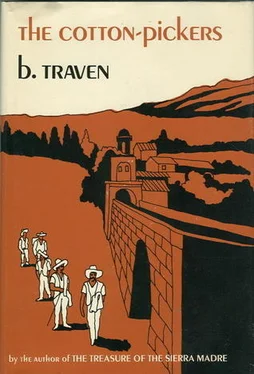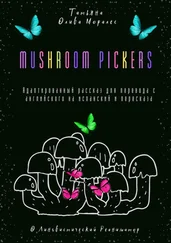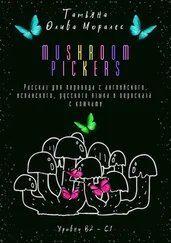B. Traven - The Cotton-Pickers
Здесь есть возможность читать онлайн «B. Traven - The Cotton-Pickers» весь текст электронной книги совершенно бесплатно (целиком полную версию без сокращений). В некоторых случаях можно слушать аудио, скачать через торрент в формате fb2 и присутствует краткое содержание. Год выпуска: 1969, Издательство: Hill and Wang, Жанр: Проза, на английском языке. Описание произведения, (предисловие) а так же отзывы посетителей доступны на портале библиотеки ЛибКат.
- Название:The Cotton-Pickers
- Автор:
- Издательство:Hill and Wang
- Жанр:
- Год:1969
- ISBN:нет данных
- Рейтинг книги:3 / 5. Голосов: 1
-
Избранное:Добавить в избранное
- Отзывы:
-
Ваша оценка:
- 60
- 1
- 2
- 3
- 4
- 5
The Cotton-Pickers: краткое содержание, описание и аннотация
Предлагаем к чтению аннотацию, описание, краткое содержание или предисловие (зависит от того, что написал сам автор книги «The Cotton-Pickers»). Если вы не нашли необходимую информацию о книге — напишите в комментариях, мы постараемся отыскать её.
—Book World
The Cotton-Pickers — читать онлайн бесплатно полную книгу (весь текст) целиком
Ниже представлен текст книги, разбитый по страницам. Система сохранения места последней прочитанной страницы, позволяет с удобством читать онлайн бесплатно книгу «The Cotton-Pickers», без необходимости каждый раз заново искать на чём Вы остановились. Поставьте закладку, и сможете в любой момент перейти на страницу, на которой закончили чтение.
Интервал:
Закладка:
Between nine and two in the daytime you couldn’t stay in the dormitory; if you’d tried you’d have turned into seared meat. But of course we didn’t try, because during those hours we were working in front of the bakery ovens. And just at the time of night when it began to get cool and we could have enjoyed a gorgeous sleep, we had to get out and go to work.
The work itself wasn’t hard; I couldn’t say that it was. But being on your feet for eighteen hours or so without a break, constantly running to and fro, bending down and reaching up, putting things here and carrying them there tires you out far more than working hard for eight hours in one spot. It was always “Quick, quick, the round rolls out of the oven… Hurry up, the devil take you, get those trays greased… Damn you, fix the beater into the mixer…. Quick, quick, I gotta have the egg whites beaten…. That mixture’s too salty; hurry, hurry, take it away and mix one up again…. I want two kilos of icing, I told you that an hour ago… Why, damn it, why didn’t you boil up the caramel yesterday? Now we’re sunk…. Holy smoke, now José has to slip up with the ice cream mix, and the slop’s all over the floor. Thanks a lot, José, we’ll all be here until six again today, if that’s the way you’re doing things.” There was a constant hustle and bustle and bullying and scurrying. I’m sure that I covered a good twenty miles a day, rushing up and down that bakehouse.
Then there was the constant change of staff. Hardly had a new man been trained than another left. In fact, training the men was our biggest stumbling block. Doux would say: “Now you’ve got two new men whom I’ve got to pay, and yet you’re not getting any more stuff baked. What’s the point of my hiring new men? There’s nothing to show for it.”
In a sense he was right, but that was because no new hands knew anything about baking. They had to be shown everything, even how to handle a hot baking tray or a wooden spoon; and while you were showing them you could have done it yourself ten times over. A few picked it up quickly, but most would get under our feet and only succeed in slowing us down. We had one pastry cook who couldn’t manage the simplest flaky pastry although he could produce recommendations from first-class patisseries.
It was the aliens who made the money for Doux. They were the ones he could exploit to the limit. The Mexican workers would put up with things for two, three, or maybe four weeks; then they’d say, “There’s too much work here!” and they’d quit. By then they had perhaps saved a few pesos to start up a small business in cigarettes, chewing gum, leather belts, revolver holsters, candy, fruit — things of that kind. Their trade would bring them a profit of about one peso a day, but they managed on it and they remained free men. Some of these small traders climbed higher and higher until they could rent some small, dark alcove — what you might call a hole in the wall — in a narrow street, where they set up shop. But we stayed on, being afraid to lose that security the bakery offered us.
Of course, we wouldn’t have been content with one peso of daily profit, for we made much more, one twenty-five with room and board. And we wanted more out of life.
Those who worked just long enough to save a little money to make themselves independent were content with cotton pants at three pesos fifty a pair; but such pants weren’t good enough for us. Ours had to cost seven or eight pesos. We felt that if we allowed ourselves to be seen in anything less expensive we would lose our dignity and status as white men. The “free” men bought shoes for six or eight pesos a pair. We wouldn’t have dared to cross the street in such footwear. Think what we’d look like! We simply couldn’t do it, if only on account of the señoritas. So our shoes never cost less than sixteen or eighteen pesos. After all, we were white men; and in order to remain so in the eyes of the other whites — Americans, British, Spaniards, French, and so on — we had to remain slaves to the bakehouse, earning good wages. Noblesse oblige — all the more so in tropical countries where the whites are only a small minority in the overwhelmingly native population.
It should be admitted however that, although we made the greatest efforts not to lose caste, we lived in an uncertain social position. The Americans, British, and Spaniards did not consider us their equals. To them we were still only filthy scum, the scum that sticks to the heels of the prosperous whites and follows them about the world, and this we remained. But it is the big bosses, the power-hungry and the profit-hunters, who create the scum; then, when conditions become too hot and they are called upon to clean it up, they just pack up their profits, go home, and let the scum rot.
We did not even belong to the mixed-bloods, the Mestizos, to whom we were alien rabble. Nor were we accepted by the pure-blooded natives, the tribes or subnations of Indians all over the Republic. They would have little to do with metropolitan migrant workers, half-vagabonds such as we. Although every native and at least two-thirds of the Mestizos were proletarian like us, we were nevertheless separated from them by a gulf that couldn’t be bridged. Language, past, habits, customs, philosophies, views, and ideas were so utterly different that no common link could be forged.
One pay day Antonio and I decided to go shopping. He bought a new hat, shirt, and shoes. I treated myself to a new pair of pants and a pair of smart brown shoes, which to make them appear as having been imported from England were called Oxfords, and so stamped in big letters on the soles. Naturally, that word alone, not the quality of the material or the manufacture, explained the extra high price I had to pay for them.
We went straight back to the dormitory and got into our new clothes.
“What’ll we do with the money we’ve got left?” said Antonio.
“That’s what I’d like to know,” I said. “I’ve been thinking there’s no use in collecting a lot of stuff we don’t want.”
“No, no point at all,” confirmed Antonio.
“But it’d be silly to keep the money in our pockets,” I went on.
“Yes,” agreed Antonio, “it would be silly, for it might be stolen.”
“And I don’t think it’s a good idea to put it in the bank, either,” I declared.
“We’d only be making ourselves ridiculous if we took our few pesos in and asked to open a bank account,” said Antonio, and he was right.
“We’d never live it down,” I said. “Anyhow, the bank’s closed now, and we can’t get there when it’s open because those are the hours when we’re working.”
“What’ll we do with the money then? I’ve absolutely no desire for tequila now,” Antonio confessed.
“Me neither. I can’t stand the smell of it right now.”
“You know what we could do?” ventured Antonio.
“Well?”
“We could go down to see the señoritas.”
“Great idea, Antonio! At least we’d know where and for what our money was blown, and, after all, we couldn’t put it to better use!”
“Sure, Gales, you’re right there. We’ll go nuts if all we do is work in the bakehouse and sleep in that rat hole.”
“Yes, and those photos on the wall are getting pretty dull, Antonio. I can’t stand the sight of those stupid paper girls much longer.”
“Neither can I. It’s almost as if we’re married to them. They seem to follow us with their eyes and watch everything we do. I’m fed up with them. We need some new faces!”
With this, Antonio got up from the edge of his cot, went over to the wall, and tore down all the beautiful naked women. Then each of us put aside one silver peso which we hid in an old shoe; we agreed that we’d buy new women and new photos of lively doings and inspiring positions to adorn our lonely walls and thus save our fancies from starvation.
Читать дальшеИнтервал:
Закладка:
Похожие книги на «The Cotton-Pickers»
Представляем Вашему вниманию похожие книги на «The Cotton-Pickers» списком для выбора. Мы отобрали схожую по названию и смыслу литературу в надежде предоставить читателям больше вариантов отыскать новые, интересные, ещё непрочитанные произведения.
Обсуждение, отзывы о книге «The Cotton-Pickers» и просто собственные мнения читателей. Оставьте ваши комментарии, напишите, что Вы думаете о произведении, его смысле или главных героях. Укажите что конкретно понравилось, а что нет, и почему Вы так считаете.











